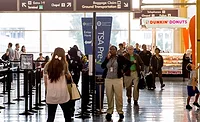Security News -- Airport Security
Racial Profiling Rife at Boston Airport, Officers Say
More than 30 federal Transportation Security Administration officers in the behavior detection program at Logan International Airport in Boston have reported that the operation has become a magnet for racial profiling instead of terrorist detection, according to a report from the New York Times.
In interviews and internal complaints, these officers asserted that passengers who fit certain profiles – Hispanics traveling to Miami or blacks wearing baseball caps backward – are more likely to be stopped, searched and questioned for “suspicious” behavior, possibly to meet managers’ demands for high numbers of stops, the article says.
The 32 officers’ written complains said that the high demands led co-workers to target minorities in the belief that those stops were more likely to yield drugs, outstanding arrest warrants or immigration problems, the Times reports.
A statement from the TSA notes that the allegations are being investigated, as the behavior detection program “in no way encourages or tolerates racial profiling,” and bans singling out passengers based on nationality, race, ethnicity or religion.
The complains from Logan, however, might have national implications, as Boston is the testing ground for an expanded use of behavioral detection methods to be used at airports around the country. While 161 airports are already using behavioral officers, the TSA is considering expanding what it considers more advanced tactics nationwide, the article says.
The Boston program uses specially trained behavioral “assessors” to not only scan the lines of passengers to look for unusual activity, but also to speak individually to each passenger and gauge their reactions while asked about their trip or for other information, the article says. The assessors would look for inconsistencies in the answers or other signs of unusual behavior, such as avoiding eye contact, sweating or fidgeting. Any passenger considered to be acting suspiciously could be pulled from the line and subjected to more intensive questioning, the Times reports.
According to the Times article: “That is what happened last month at Logan airport to Kenneth Boatner, 68, a psychologist and educational consultant in Boston who was traveling to Atlanta for a business trip.
“In a formal complaint he filed with the agency afterward, he said he was pulled out of line and detained for 29 minutes as agents thumbed through his checkbook and examined his clients’ clinical notes, his cellphone and other belongings.
“The officers gave no explanation, but Dr. Boatner, who is black, said he suspected the reason he was stopped was his race and appearance. He was wearing sweat pants, a white T-shirt and high-top sneakers.
“He said he felt humiliated. ‘I had never been subjected to anything like that,’ he said in an interview”
While the TSA does not record information on race or ethnicity of travelers, several officers estimated, based on their own observations, that minorities accounted for as many as 80 percent of passengers searched during certain shifts, the article says. The officers identified nearly two dozen co-workers who they said consistently focused on stopping minority members in response to pressure from managers to meet certain threshold numbers for referrals to the State Police, federal immigration officials and other agencies, according to the Times.
Officers say that this profiling undermines the usefulness of the program, and “takes officers away from the real threat, and we could miss a terrorist we are looking for.”
And, while the TSA still defends the program, others are skeptical of the science behind behavioral detection entirely, believing that detecting simple emotions like happiness or sadness is possible, but the link in determining whether individuals hold terrorist intent or beliefs is “nonexistent,” the article says.
Looking for a reprint of this article?
From high-res PDFs to custom plaques, order your copy today!



